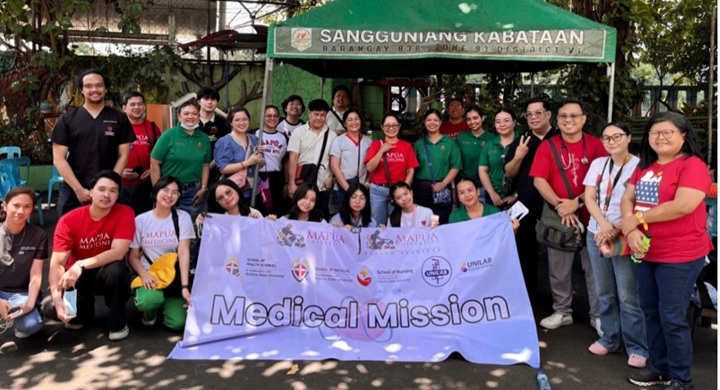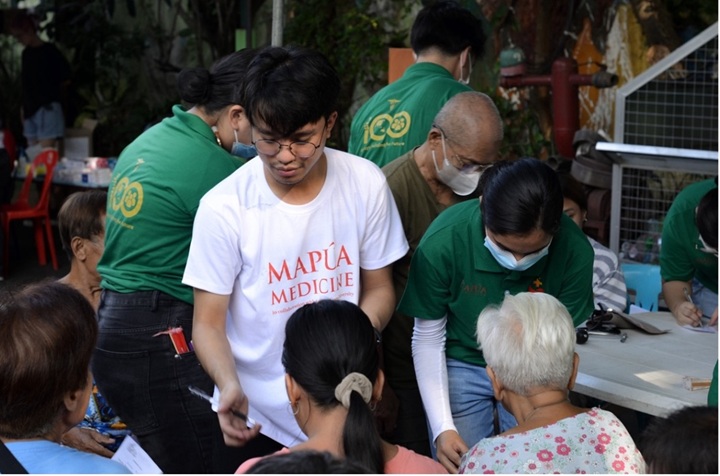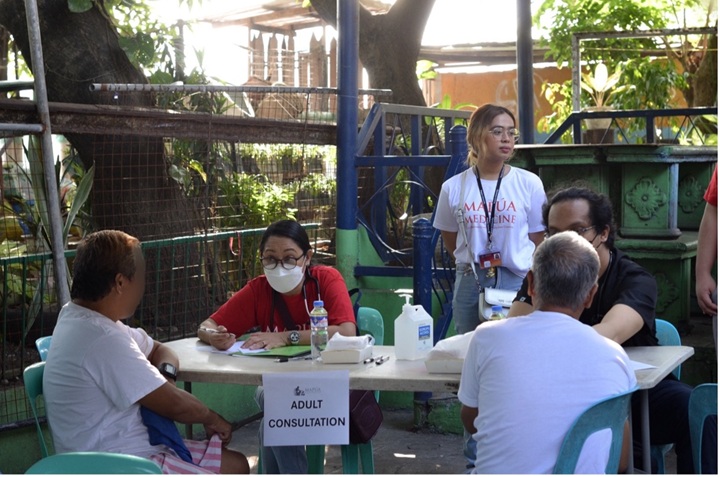
Nearly 400 residents of Barangay 836 in Pandacan, Manila recently received free healthcare services during a one-day community outreach program organized by Mapúa School of Medicine, School of Nursing, and School of Health Sciences in collaboration with Arizona State University (ASU). This is the first-ever community outreach organized by the allied health sciences group together.
The community outreach, a part of the institution’s social orientation and community involvement program (SOCEP), provided free medical consultations for adults and children, medicines sponsored by Unilab, circumcision or “tuli”, physical therapy services, mental health awareness lectures, and Basic Life Support training to the community.
Brgy. 836 chairwoman Renita Curameng shared how the activity eased the financial burdens of the residents.
“Kaya itong mga medical missions gaya nito, malaking bagay sa kanila. Talagang gusto ko [ng medical missions kagaya nito] para mapakinabangan din ng community (That’s why medical missions like this one are a huge help. I really like medical missions because the community benefits from this),” Curameng said.
Brgy. Kagawad Domingo Seposo, one of the residents and a senior citizen, expressed his appreciation and gratitude for the activity.
“We are very grateful to Mapúa [University] and sa Kapitan namin ngayon kasi may reciprocation of efforts. Sa lugar namin, medyo mahirap. Kapag medical sa government, medyo kulang minsan at pahirapan pa. Samantalang dito sa Mapúa, volunteers na nila ang nagpunta dito. Malaking tulong lalo na sa mga seniors na kailangan na rin ng maintenance medicines (We are very grateful to Mapúa and to our barangay captain because there is reciprocation of efforts. Ours is an underprivileged community. Sometimes there’s difficulty in lining up seeking medical assistance in government [institutions]. With Mapúa, the [medical] volunteers are the ones visiting and serving us. It’s a big help especially for seniors who need maintenance medicines),” Seposo said.
Dean Emmilie Joy Mejia, Dean of Mapúa School of Nursing, explained that while the community outreach is a way to extend assistance to the community, it also helps the students.
“The Pandacan area is an adopted community of Mapúa. If we can do [community outreach], if we can make it and if we can help them, then we will,” Mejia began. She was also quick to say that the activity is beneficial for the students as well.
“Medical services for the community are a really big help for our students. Students are exposed not only in the clinical area per se but also in serving the community. They [earn] real world experience,” she added.
The sentiment is shared by Dr. Marco Antonio Escareal, Head of Simulation at Mapúa School of Medicine, and considered this a valuable training for the students.
“Kapag medical mission, dito mo makikita iyong katotohanan sa lipunan in areas na hindi well-to-do ang mga tao. We’re also making sure that with these basic science concepts, naka-link ang practice of medicine sa care for human beings. By exposing the students early, ang hope namin is ma-connect nila iyong structure and function sa actual practice. It’s very important to be able to connect what we learn in the classroom. At the same time, we’re able to help the community and give back at a very early age in their studies (In a medical mission, this is where you see societal realities in areas where people are not well-to-do. We’re also making sure that with these basic science concepts, the practice of medicine and care for human beings are linked. By exposing the students early, the hope is for the students to connect structure and function to actual practice. It’s very important to be able to connect what we learn in the classroom. At the same time, we’re able to help the community and give back at a very early age in their studies),” Escareal noted.
He also underscored the interprofessional education (IPE) brought about by Mapúa School of Medicine, School of Nursing, and School of Health Sciences’ collaboration with ASU.
“The medical mission is our students’ first exposure in interprofessional setting at the level of their studies. Eventually, this is how their life is going to be. In real life, you don’t practice on your own. You work with a team of nurses, nutritionists, physical therapists, psychologists and more. You learn to work with people you don’t see everyday with different perspectives. You don’t get these lessons in a classroom. You’ll get it in actual situations when you’re serving people,” he stated.
The students echoed the benefits they experience in serving as volunteers in a community outreach program.
Mylene Garcia, a School of Medicine student, shared her thoughts about the activity.
“It opens our eyes. Whatever we learn from the classrooms are validated. We see in action the reality of what’s out there. Nagma-match kung ano iyong nalalaman namin sa classroom sa kung ano iyong nakikita naming ngayon (What we learned in the classroom matched what we’re seeing here right now). It shows paano nila pinag-isipan kung ano yung ituturo nila sa amin kasi very updated sila and very exposed sila sa kung ano yung reality sa community (It shows that what the faculty teaches are well-thought-out because they are updated and exposed to the reality in the community),” Garcia said.
Kathleen Kay Juanico, a B.S. Nursing student, was grateful for the experience.
“I really feel blessed to be able to experience such opportunity. Not everyone can experience this. It’s really helpful because it opened our eyes to what would be the scenario in the future. It will also prepare us to cater to the needs of our patients and, of course, assist the doctors in the mission. [This experience] will bring you down to earth—to the real scenario of healthcare in the Philippines,” Juanico remarked.
The community outreach is a testament to the mission of the collaboration between Mapúa School of Medicine, School of Nursing, School of Health Sciences, and ASU. The collaboration empowers students not just with world-class knowledge but also with extensive global exposure that will help prepare the students for diverse healthcare roles in the future.

